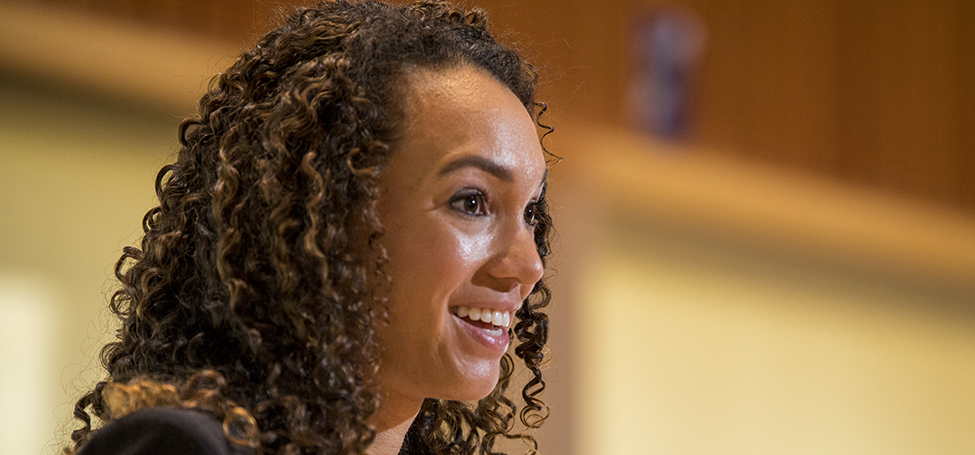
“Baby, She Had Sisters”
In 2014 Gina Clayton founded Essie Justice Group, and in 2017 she was awarded the $100,000 Grinnell College Innovator for Social Justice Prize. The Essie Justice Group creates “communities of belonging” through a nine-week “Healing to Advocacy” model to fight for an end to mass incarceration. While most attempts to find solutions to mass incarceration focus on men, Clayton instead focuses on the need and activist potential of the millions of women with incarcerated loved ones. As a woman with an incarcerated loved one herself and as a Harvard-educated lawyer, Clayton integrates both personal experience and professional expertise into her work.
From idea to action: Founding Essie Justice Group
Sometimes, the solutions to problems are hidden in plain sight.
After graduating from Harvard Law School in 2010, Clayton joined the Neighborhood Defender Service of Harlem as a housing attorney. There, she came face-to-face with the problem that would define her career.
“My clients were the mothers, the grandmothers, the sisters, daughters, wives, and girlfriends of people who were arrested, charged, and incarcerated,” says Clayton. Often the women she represented felt so isolated and embarrassed by their association with someone who had run afoul of the law that they weren’t preparing for a fight, says Clayton — they were preparing to surrender.
Clayton felt the need to address the root cause of the problem she was seeing, instead of continuing to work within the confines of an inherently oppressive system. She wanted to end the suffering and shame of women with incarcerated loved ones, and ultimately, mass incarceration itself. So, Clayton says, “I went to where I knew the ailments of our people suffering have always been found. I went to our matriarchs.”
The matriarch of Clayton’s family was back home, in California. Clayton’s grandmother was the daughter of a woman who left a Jim Crow-era Louisiana sharecropping farm in 1938 to come to California, working three jobs and raising three children as a single mother in a new city. She did this to provide herself and her children with better opportunities, and she succeeded.
Clayton wanted to know how her great-grandmother had done it. How had Essie overcome poverty, isolation, sexism, and racism? How had she persevered? Clayton’s grandmother appeared surprised that her granddaughter didn’t already know. “Baby,” she said, “she had sisters.”
Sisterhood as innovation
“We are living in a society that has bought into the myth that every person with a conviction and their children and their spouses are unworthy, unredeemable, and unlike any of us,” says Clayton. At a time when we so often look to Silicon Valley for “innovative” solutions to the world’s problems, Clayton recognizes that, when doing social justice work, innovation is found by “creating movements for change that are led by the people directly affected.”
After Clayton visited her grandmother, she set to work trying to figure out how to build a sense of sisterhood among some of the most isolated women in the country. What she came up with was Essie Justice Group’s signature nine-week Healing to Advocacy program, currently operating in the California Bay Area and soon to expand to a second location in Florida.
Incarcerated men and women nominate women in their lives who are helping them by providing financial support, driving hundreds of miles to visit, taking care of their children, or advocating for their rights when they cannot. Clayton or another woman with an incarcerated loved one then personally calls each woman and reads her loved one’s nomination letter. “That is our first programmatic isolation-breaking touch,” says Clayton.
The women nominated are invited to attend nine sessions that focus first on healing, then on advocating for themselves and their loved ones. So far, approximately 50 women have graduated into the “Essie Sisterhood,” ready to become anti-mass incarceration advocacy leaders.
In the spring of 2017, Clayton received a personal phone call of her own. What she had expected to be an interview turned out to be President Raynard S. Kington calling to inform her that she had won the Grinnell Prize. Now, after fine-tuning her process, Clayton can start expanding her vision. “The Grinnell Prize is helping make my dream of building in Florida and two additional states in the next three years possible.”
Communities of belonging and the liberal arts
The value of the Grinnell Prize, however, goes beyond the monetary award itself. Clayton and two other representatives from the Essie Justice Group spent a week on campus in October participating in workshops, panels, and class visits. Clayton clearly found her time with Grinnell students exhilarating (and after a week of a fully-booked schedule, more than a little exhausting).
“The experience of being here and being fully integrated for a week with the fantastically deep, curious, and passionate Grinnell community has been like nothing that I have ever experienced before,” says Clayton. “It is so deeply meaningful to have a group of people that I have such tremendous respect for have such faith in this vision. I’m beyond moved.”
Throughout the week, Clayton showed how much respect she had for Grinnell students and their willingness to engage. She challenged them to brainstorm ways that the Essie Justice Group could improve and to think about building community in their own social justice efforts. “Creating communities of belonging in this climate is resistance work,” she says. “This is how movements happen.”
Grinnell is the type of place that is catalytic to social justice movements. It provides resources to fund justice work, opportunities for students to engage with current innovators, and a space in which students are constantly asked to question and challenge the status quo.
“It has become clear to me that this is a community where social justice belongs,” says Clayton. “And it feels like home.”
